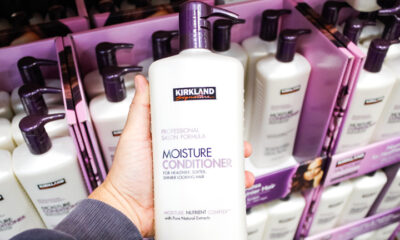NEWS
Want the Job? Avoid Asking These 22 Interview Questions
Published
3 months agoon

Shutterstock
Navigating a job interview is as much about what you ask as it is about how you answer. While asking thoughtful questions can demonstrate your interest in the role and the company, the wrong ones can instantly damage your credibility and even cost you the job offer. It’s easy to make a poor impression by unknowingly crossing boundaries or revealing misplaced priorities. That’s why understanding which questions to avoid is crucial for interview success.
Let’s take a look at questions you should never ask in a job interview, and why steering clear of them will help you leave a positive and lasting impression on your potential employer.
What does this company do?

Shutterstock
Asking this question signals a complete lack of preparation and can be a major red flag to interviewers. It shows that you haven’t taken the time to research the company or its industry, which is a basic expectation for any candidate. When you come in uninformed, you risk being seen as disinterested and uninvested. It’s essential to familiarize yourself with the company’s mission, products, services, and recent developments beforehand. This not only demonstrates your commitment but also allows you to ask more insightful and relevant questions during the interview.
How much vacation time do I get?

Shutterstock
While vacation time is an important factor for employees, bringing it up too soon might make you seem more concerned with time off than the responsibilities of the role. This question can lead the interviewer to believe that you’re focused on benefits rather than the position itself. Instead, wait until you have an offer in hand to discuss benefits such as vacation days, sick leave, and other perks. This approach will make you appear more professional and ensure that your primary focus is on contributing to the organization. After all, you want to be perceived as someone eager to work rather than someone planning their next getaway.
What’s the salary for this position?

Shutterstock
Salary is a crucial aspect of any job, but asking about it too early can send the wrong message. It can give the impression that you’re only interested in the financial gain rather than the role’s responsibilities and growth opportunities. Typically, it’s best to wait for the employer to bring up the topic of compensation or until you receive an offer. At that point, you’ll have more leverage and can engage in a more informed discussion. Until then, focus on demonstrating your value and interest in the role itself.
Will I need to work overtime or on weekends?

Shutterstock
This question might imply that you’re not willing to go the extra mile if needed or are inflexible with your schedule. While work-life balance is essential, you don’t want to raise doubts about your dedication and availability during the interview. A better approach is to research the company culture and typical work hours in advance or to wait until the later stages of the interview process to discuss workload expectations. Showing that you’re adaptable and open to occasional extra hours can position you as a team player. Being overly concerned about these aspects early on can make you seem uninterested in the role’s potential demands.
When can I expect a promotion?

Shutterstock
Asking about promotions before you’ve even landed the job can come across as presumptuous and self-serving. It may suggest to the interviewer that you’re more focused on climbing the corporate ladder than contributing effectively in the position you’re being considered for. While career progression is a valid concern, it’s best to express your interest in long-term growth by asking about training and development opportunities instead. This shows that you’re committed to excelling in the role and adding value to the company. Once you’ve established yourself in the position, then you can have a discussion about career advancement.
Do you conduct background checks?

Shutterstock
This question is problematic because it immediately raises suspicions about why you might be concerned with a background check. It can suggest that there’s something in your past you’re worried will disqualify you from consideration. If a background check is standard procedure, it will likely be mentioned during the interview or hiring process. The best approach is to be upfront about any issues on your record, if necessary, and let the employer decide. Being honest and proactive is far better than making the interviewer question your suitability for the role.
Do you monitor employee internet activity?

Shutterstock
While some companies do monitor employee activity for security and productivity reasons, asking about this in an interview can make you seem more focused on what you can get away with rather than your work. It can also suggest that you’re concerned about having limited freedom or privacy, which could be a red flag for employers. If you have concerns about a restrictive work environment, you can inquire about the company culture more broadly. Focus on understanding the expectations for productivity and communication rather than specific monitoring policies. This will help you assess whether it’s a good fit without raising unnecessary concerns.
How soon can I take sick leave?

Shutterstock
Asking about sick leave during an initial interview might imply that you’re planning to take time off before you’ve even started the job. While everyone falls ill occasionally, discussing it too early in the process can be off-putting to interviewers. It’s best to wait until you have an offer or are at the final stages of the interview process to discuss leave policies. If you have a genuine health concern that may affect your attendance, it’s better to address it transparently once you’re further along in discussions. This approach will show that you’re professional and considerate of the company’s needs.
Can I work from home?

Shutterstock
Remote work has become more common, but asking this question too early can signal that you’re more interested in working outside the office than engaging with the team. If the job is advertised as remote or hybrid, the company will typically outline these details in the job description. Otherwise, wait until you’ve received an offer or the topic is brought up organically to discuss working from home. By first proving your willingness to be flexible and collaborative, you’ll increase the likelihood of negotiating favorable working conditions later. This also ensures you’re seen as a dedicated candidate rather than someone who’s only concerned about convenience.
Do you have a policy on dating coworkers?

Shutterstock
Bringing up dating policies in an interview is highly inappropriate and unprofessional. It suggests that you’re more focused on personal relationships than the role or company culture. This kind of question can also raise concerns about your ability to maintain professionalism in the workplace. It’s better to focus on questions that highlight your interest in the team’s dynamics and collaboration instead. Remember, interviews are about showcasing your qualifications and fit for the role—not exploring social or romantic interests.
What happens if I don’t meet my goals?

Shutterstock
This question might indicate a lack of confidence in your ability to perform or achieve targets. It can suggest that you’re already expecting to struggle, which isn’t the impression you want to leave with an interviewer. Instead, you can ask how the company supports employees in achieving their goals or how success is measured. This allows you to gain insight into expectations and resources available to employees while showing that you’re committed to meeting and exceeding those standards. Highlight your willingness to succeed rather than hinting at potential failures.
Can I change my schedule if I need to?

Shutterstock
Flexibility is important for many employees, but asking about altering your schedule before securing the job can make it seem like the company’s needs are secondary to your own. It’s best to wait until the employer brings up scheduling or to inquire once you’re deeper into the hiring process. This way, you avoid appearing demanding or uncommitted to the role’s expectations. Focus on understanding the typical work hours and any flexibility policies before making such requests. Once you’re onboard, you can have more detailed discussions about accommodating personal needs.
Do you track employee attendance?

Shutterstock
Asking about attendance tracking might suggest that you’re concerned about being held accountable for your time. This question can make the interviewer wonder if you have issues with punctuality or attendance in general. If you’re curious about flexibility or work-life balance, it’s better to ask about the company’s culture and values instead. Understanding these aspects can provide insight into their approach to monitoring attendance without raising red flags. Being seen as someone reliable and professional will work in your favor.
What’s your stance on social media use during work hours?

Shutterstock
This question can make it appear as though you’re more interested in personal time than professional responsibilities. Social media policies vary widely, but bringing this up in an interview can make you seem unfocused or disengaged. If you’re genuinely concerned about company policies on social media, it’s better to review the employee handbook or ask about the company’s communication policies more broadly. Concentrating on your professional contributions rather than personal interests will leave a better impression. Save such questions for after you’re hired, when they’re more appropriate.
Will I have my own office?

Shutterstock
While it’s understandable to be curious about your work environment, asking this question too soon can make it seem like you’re overly concerned with status or comfort. It’s more appropriate to ask about the team structure and how collaboration typically happens within the company. This shows that you’re more interested in being an effective team member than in having your own space. Once you’ve received an offer or are in the final stages of discussion, you can inquire about workspace arrangements. At that point, it’s seen as less of a priority and more of a logistical query.
Are there any penalties for being late?

Shutterstock
This question might lead the interviewer to think that punctuality is a problem for you. It’s better to demonstrate your time management skills and ask about typical work hours instead. Showing that you’re interested in adhering to the company’s schedule will convey reliability and professionalism. If you have specific circumstances that may affect your arrival time, address them once you’re deeper into the process or once you’ve secured the job. Being upfront about potential conflicts is fine, but framing it as a question about penalties can be off-putting.
How long is the lunch break?

Shutterstock
Asking about lunch breaks during an interview can give the impression that you’re more focused on time away from work than the job itself. It’s best to wait until you have an offer or are closer to accepting a role to discuss specific break policies. Instead, consider asking about the company’s culture around work-life balance, which can give you insight into their approach to breaks and overall employee well-being. Demonstrating that you’re more focused on your contributions and fit with the team is key. Break policies will fall into place once the employer sees your enthusiasm.
Is there a lot of gossip here?

Shutterstock
This question is inappropriate as it reflects poorly on your priorities and suggests that you might be looking to engage in or be affected by office drama. While a positive and respectful workplace is essential, there are better ways to assess company culture. You can ask about team dynamics, how conflicts are handled, or the values the company upholds. This way, you show that you’re interested in a healthy work environment rather than focusing on negative aspects. Making a good impression means highlighting your focus on professional rather than personal matters.
What do other employees think about the company?

Shutterstock
While understanding employee satisfaction is essential, asking this question in an interview can come off as overly concerned with others’ opinions. Instead, ask about the company culture, team dynamics, or what makes the company a great place to work. This approach shows that you’re interested in the environment and what it has to offer rather than comparing your decision to others’ experiences. It’s a subtle but important difference that portrays you as a proactive, positive individual focused on finding the right fit.
How many warnings do you give before terminating someone?

Shutterstock
Bringing up termination policies during an interview can be a significant red flag, as it suggests that you’re worried about job security or potential performance issues. Instead, frame your question around support systems or professional development opportunities the company offers to help employees succeed. This shows that you’re focused on growth and improvement rather than potential failure. Asking the right questions conveys a commitment to excelling and contributing positively, leaving the interviewer with a better impression of your priorities.
Do you offer free lunches or other perks?

Shutterstock
While perks can be appealing, asking about them too early can make it seem like you’re more interested in benefits than the job itself. If the company has unique perks, they’ll likely be mentioned during the interview or listed in the job description. Wait until you’ve received an offer or are at the final stages to discuss perks more openly. Until then, focus on understanding the role and company culture to show that you’re more concerned with contributing and fitting in. It’s important to align your questions with what the company values in a candidate.
What’s your policy on mental health days?

Shutterstock
Although mental health is crucial, bringing it up too early might suggest that you’re planning on taking frequent time off. A better approach is to ask broader questions about the company’s stance on work-life balance and employee well-being. This shows that you care about a healthy work environment without giving the impression that you’re looking for opportunities to be absent. Once you’re further along in the process, you can ask more specific questions about the company’s mental health support policies. Focusing on a positive work-life balance during interviews sets the right tone.
Conclusion

Shutterstock
When in a job interview, it’s crucial to ask questions that demonstrate your understanding of the company, enthusiasm for the role, and willingness to contribute to the organization’s success. Avoiding these questions will help you make a positive impression and increase your chances of getting the job. Instead, focus on asking about the company’s goals, team dynamics, and opportunities for growth—questions that show your long-term interest and alignment with the company’s mission.
ADVERTISEMENT - CONTINUE BELOW
Related Topics:

About Money+Investing
Money + Investing provides our community with the latest personal and business finance news from around the world. We publish money saving and earning tips to help you make smartier investing decisions. We're inspired by exploring and providing new ways for our audience to achieve financial freedom. We can't wait to share all of our exciting deals, guides and reviews to help you live your financial life to the fullest.
More Money + Investing
-


10 Beloved Vintage Car Features Lost to Time
-


16 Ultra-Luxurious Vacations Worth Every Penny
-


Rue21 Bows Out: Another Retailer Closes All Doors
-


Mortgage Demand Continues to Fall Despite Drop In Interest Rates
-


21 Electric Vehicle Problems Owners Discover Months After Buying
-


20 Witty Reasons Mature Women Are Choosing the Single Life
-


25 Genius Staging Tips to Speed Up Your Home Sale
-


20 Motivations Behind Baby Boomers’ Shift to Minimalism
-


Unmasking Kirkland: The Big Brands Behind Costco’s Best Buys
-


20 WWII Military Marvels That Redefined Warfare
-


17 Unmistakable Clues That Someone Is Gaslighting You
-


20 Easy Ways to Keep Energy Costs Low During Chilly…